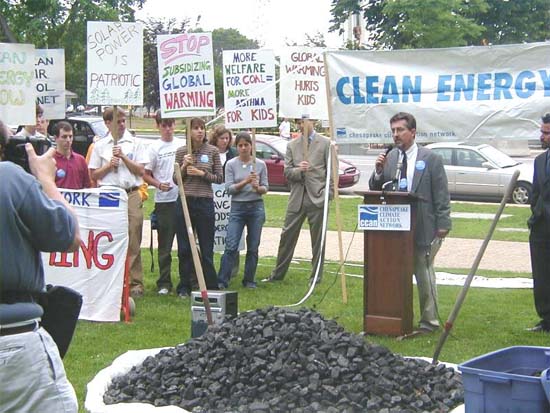
Congress has told the corps to build bigger and better levees as a result of Katrina, and it's obeying. But there have been no direct orders pertaining to global warming. Indeed, just last May, a Senate bill that would require the corps to consider the impact of climate change in designing all its water resources projects nationwide fell nine votes short of the 60 needed to beat a filibuster. In that context, the corps' decision to plan for even modest future sea-level rise in New Orleans might seem a minor miracle. Will a new U.S. president and larger Democratic majorities in Congress change the nation's approach to saving coastal Louisiana? Maybe. But what's really needed is a realization among a majority of American voters that life without New Orleans will be one of the biggest and most painful -- and perhaps earliest -- casualties of global warming. And if we can't save New Orleans, is there really any hope for Miami, Charleston, New York, Annapolis, and all the other low-lying coastal cities in the queue? Author Mike Tidwell, founder of the Chesapeake Climate Action Committee, served as a Peace Corps Volunteer in Congo Kinshasa.
Mike Tidwell writes: Army Corps climate efforts in New Orleans may not be enough
A Widening Gulf?
Army Corps climate efforts in New Orleans may not be enough
By Mike Tidwell
20 Mar 2008
Here's the good news: The Army Corps of Engineers is "racing" to complete a comprehensive levee system for metropolitan New Orleans by 2011 that actually takes into account global warming, at least in terms of sea-level rise.
The Army Corps and the Mississippi
Here's the bad news: the levee system under development is wildly insufficient to the growing climate problem, according to many informed critics.
That's because the vast and flat Louisiana coastal area -- sometimes called the "Bangladesh of America" because it could disappear due to sea-level rise alone -- cannot be saved just by building levees. It's the one area of America which, to survive the rising water and bigger hurricanes of a warming world, must develop human-made barrier islands and coastal marshes as an additional emergency defense. These landforms, which can be crafted using the voluminous sediments of the Mississippi River itself, would create a vital buffer that complements the levees, according to a wide range of engineers.
"It all comes down to this: You simply can't build the levees high enough under any scenario in Louisiana," said Clifford Smith, a member of the prestigious Mississippi River Commission, a seven-member panel created by Congress to advise the corps on works projects. "That the corps still doesn't act on this fact, doesn't commit to building wetlands and barrier islands immediately, leaves me so depressed you can't imagine it. I'm in depression over this."
Ironically, many Americans still point to Hurricane Katrina as the event that finally got their attention on global warming. It's impossible to definitively prove or disprove the connection of any single weather event to global warming. But it was Katrina and the record hurricane season of 2005 that left many folks wondering what was up with the weather. Nearly three years later, global warming practically dominates the daily news in dozens of different ways. Author Bill McKibben describes the change in our national awareness this way: "Katrina opened the door and Al Gore walked through it."
But even after a Nobel Prize last fall for Gore, who shared it with the world's leading climate scientists, and even after new studies showing hurricanes are getting bigger and more frequent due to warming oceans, the Army Corps can't seem to commit to a protection plan that matches the global climate reality as it pertains to New Orleans.
"The number one thing protecting New Orleans right now is not the corps, it's chance," says Tulane University law professor and coastal protection activist Oliver Houck. "The historical odds show Katrina doesn't come every day. That's all that's really protecting us right now. The odds."
[Excerpt]
Building a Legacy
The missing weapon, according to Davis and others, is the Mississippi River itself. Carefully diverting part of the river's muddy water away from the main stem and toward rapidly eroding coastal areas would allow sediments to build up and create land in the ancient delta-forming fashion. Special pipelines and canals could be used to surgically deliver the sediment-rich water to exactly the spots where land is needed most to protect against hurricane surges made worse by sea-level rise. With sufficient planning and funding -- at least $28 billion -- and a willingness to relocate at least some of the coastal population, there's little doubt among engineers and coastal geologists that the process will succeed in making land.
"We could build entire barrier islands in 12 months or less," says Davis, who now directs Tulane's Institute on Water Resources Law and Policy.
There's just no sign so far that the corps is ready to commit to the process. Without it, however, most serious observers view New Orleans as flat-out doomed.
The ultimate problem, according to Davis, is that the corps takes its orders directly from Congress, a body that has only recently begun to discuss climate change seriously, much less act on it. Congress has told the corps to build bigger and better levees as a result of Katrina, and it's obeying. But there have been no direct orders pertaining to global warming. Indeed, just last May, a Senate bill that would require the corps to consider the impact of climate change in designing all its water resources projects nationwide fell nine votes short of the 60 needed to beat a filibuster. In that context, the corps' decision to plan for even modest future sea-level rise in New Orleans might seem a minor miracle.
Will a new U.S. president and larger Democratic majorities in Congress change the nation's approach to saving coastal Louisiana? Maybe. But what's really needed is a realization among a majority of American voters that life without New Orleans will be one of the biggest and most painful -- and perhaps earliest -- casualties of global warming.
And if we can't save New Orleans, is there really any hope for Miami, Charleston, New York, Annapolis, and all the other low-lying coastal cities in the queue?








